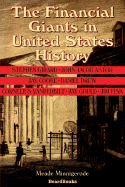|
|
|
|
||||||

|
The Financial Giants in United States History A revealing look at some of America's early titans of business and industry. Publisher Comments Originally published in 1927 as Certain Rich Men, this book presents a glimpse into the rise and modus operandi of the fascinating men who, through acumen and daring, made lasting impressions in the world of business and finance. Included are: Stephen Girard, the merchant banker; John Jacob Astor, the fortune maker; Jay Cooke, the tycoon; Daniel Drew, the "old man" of Wall Street; Cornelius Vanderbilt, the Commodore; Jay Gould, the "Wizard of Wall Street"; and James Fisk, the mountebank. From Turnarounds and Workouts, March 15, 2004 The financial giants were Stephen Girard, John Jacob Astor, Jay Cooke, Daniel Drew, Cornelius Vanderbilt, Jay Gould, and Jim Fisk. The accomplishments of some have made them household names today. But all were active in the mid 1800s. This was a time when the United States, having freed itself from Great Britain only a few decades earlier, was gaining its stride as an independent nation. The country was expanding westward, starting to engages in significant international trade, and laying the foundations for becoming a major industrial power. Astor, Vanderbilt, Gould and the others played major parts in all these area. During the Civil War in the first half of the 1860s, some became leading suppliers of goods or financiers to the Federal government. Minnigerode's focus is the highlights of the life of each of the seven. Along with this, he identifies each one's prime characteristics contributing to his road to fortune and how his life turned out in the end. Not all the men managed to keep and pass on the fortunes they amassed. They are seen as "financial giants" not only because they made fortunes in the early days of American business and industry, but also for their place in laying out the groundwork for American business enterprise, innovation, and leadership, and for the notoriety they had in their day. Minnigerode summarizes the style or achievement of each man in a single word or short phrase. Stephen Girard is "The Merchant Banker"; Cornelius Vanderbilt, "The Commodore"; "The Old Man of the Street" summarizes Daniel Drew; with "The Wizard of Wall Street" summarizing Jay Gould. Jim Fisk is "The Mountebank". Jay Cooke, "The Tycoon" was to be "known throughout the country for his astonishingly successful handling of the great Federal loans which financed the Civil War." After the War, one of the leaders of the Confederacy remarked that the South was really defeated in the Federal Treasury Department, thus even on the enemy side, giving recognition to Cooke's invaluable work of enabling the Federal government to meet the huge costs of the War. After the War, having earned the reputation as "the foremost financier in the county," Cooke became involved in many large financial ventures, including the building of a railroad to link the East and West coasts of America. In this railroad venture, however, Cooke and his banking firm made a fatal misstep in investing in the Northern Pacific railway. The Northern Pacific turned out to be a house of cards. When Cooke's firm was unable to meet interest payments it owed because of money it had put into the Northern Pacific, the firm went bankrupt; and this caused alarm in the stock market and financial circles. The roads to wealth of the "financial giants" were not smooth. Like others amassing great wealth, they had to take risks. The tales Minnigerode tells are not only instructive on how individuals have historically made fortunes in business and the characteristics they had for this, but are also cautionary tales on the contingency of great wealth in some circumstances. Although the social and business conditions in the early and mid 1800s when the U.S. was in the early stages of its development were unique to that period, by concentrating on the characteristics, personalities, strategies, and activities of the seven outstanding businessmen of this period, Minnigerode highlights business traits and acumen that are timeless. His sharply-focused, short biographies are colorful and memorable. Meade Minnegerode, 1887-1967, received a B.A. from Yale in 1910, and was the author of numerous books. In addition to experience in the book publishing field and in business enterprises, he was a member of the Defense Council, and he was awarded the French Commemorative Medal for service with French troops, the French Victory Medal, and the Army Air Forces Aircraft Warning Service Medal.
|
|
|
|
home
| about
us | contact
us | related
sites |